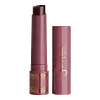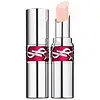Juvia's Place Volumizing Gloss Stick Versus Yves Saint Laurent Rouge Volupté Candy Glaze Lip Gloss Stick
What's inside
What's inside
 Key Ingredients
Key Ingredients

 Benefits
Benefits

 Concerns
Concerns

 Ingredients Side-by-side
Ingredients Side-by-side

Diisostearyl Malate
EmollientPolybutene
Polyglyceryl-2 Triisostearate
EmulsifyingBis-Diglyceryl Polyacyladipate-2
EmollientCaprylic/Capric Triglyceride
MaskingMenthoxypropanediol
MaskingSynthetic Wax
AbrasiveMicrocrystalline Wax
Emulsion StabilisingStearalkonium Hectorite
Gel FormingParaffin
PerfumingTocopheryl Acetate
AntioxidantPropylene Carbonate
SolventEthylene/Propylene Copolymer
AbrasiveCaprylyl Glycol
EmollientPhenoxyethanol
PreservativeButyrospermum Parkii Butter
Skin ConditioningAroma
Hexylene Glycol
EmulsifyingPentaerythrityl Tetra-Di-T-Butyl Hydroxyhydrocinnamate
AntioxidantVanillyl Butyl Ether
MaskingCI 77499
Cosmetic ColorantCI 15850
Cosmetic ColorantCI 77491
Cosmetic ColorantCI 45410
Cosmetic ColorantDiisostearyl Malate, Polybutene, Polyglyceryl-2 Triisostearate, Bis-Diglyceryl Polyacyladipate-2, Caprylic/Capric Triglyceride, Menthoxypropanediol, Synthetic Wax, Microcrystalline Wax, Stearalkonium Hectorite, Paraffin, Tocopheryl Acetate, Propylene Carbonate, Ethylene/Propylene Copolymer, Caprylyl Glycol, Phenoxyethanol, Butyrospermum Parkii Butter, Aroma, Hexylene Glycol, Pentaerythrityl Tetra-Di-T-Butyl Hydroxyhydrocinnamate, Vanillyl Butyl Ether, CI 77499, CI 15850, CI 77491, CI 45410
Diisostearyl Malate
EmollientBis-Behenyl/Isostearyl/Phytosteryl Dimer Dilinoleyl Dimer Dilinoleate
EmollientPentaerythrityl Adipate/Caprate/Caprylate/Heptanoate
EmollientVp/Hexadecene Copolymer
Paraffin
PerfumingOctyldodecanol
EmollientCera Microcristallina
Emulsion StabilisingCI 45410
Cosmetic ColorantSorbitan Sesquioleate
EmulsifyingSynthetic Wax
AbrasiveAlumina
AbrasiveDisteardimonium Hectorite
StabilisingCI 15985
Cosmetic ColorantTocopheryl Acetate
AntioxidantEthylene/Propylene Copolymer
AbrasivePropylene Carbonate
SolventParfum
MaskingDextrin Palmitate
EmulsifyingTocopherol
AntioxidantMangifera Indica Seed Oil
EmollientSodium Hyaluronate
HumectantCaprylic/Capric Triglyceride
MaskingWater
Skin Conditioning1,2-Hexanediol
Skin ConditioningMangifera Indica Fruit Extract
Skin ConditioningPunica Granatum Fruit Extract
AntioxidantDiisostearyl Malate, Bis-Behenyl/Isostearyl/Phytosteryl Dimer Dilinoleyl Dimer Dilinoleate, Pentaerythrityl Adipate/Caprate/Caprylate/Heptanoate, Vp/Hexadecene Copolymer, Paraffin, Octyldodecanol, Cera Microcristallina, CI 45410, Sorbitan Sesquioleate, Synthetic Wax, Alumina, Disteardimonium Hectorite, CI 15985, Tocopheryl Acetate, Ethylene/Propylene Copolymer, Propylene Carbonate, Parfum, Dextrin Palmitate, Tocopherol, Mangifera Indica Seed Oil, Sodium Hyaluronate, Caprylic/Capric Triglyceride, Water, 1,2-Hexanediol, Mangifera Indica Fruit Extract, Punica Granatum Fruit Extract
Ingredients Explained
These ingredients are found in both products.
Ingredients higher up in an ingredient list are typically present in a larger amount.
This ingredient is an emollient, solvent, and texture enhancer. It is considered a skin-softener by helping the skin prevent moisture loss.
It helps thicken a product's formula and makes it easier to spread by dissolving clumping compounds.
Caprylic Triglyceride is made by combining glycerin with coconut oil, forming a clear liquid.
While there is an assumption Caprylic Triglyceride can clog pores due to it being derived from coconut oil, there is no research supporting this.
Learn more about Caprylic/Capric TriglycerideCI 45410 is a synthetic red-pigment and dye.
It often goes by both Red 28 or Red 27; manufacturers label both ingredients as CI 45410.
This dye is commonly found in makeup because it imparts a vivid color. Some types of this dye change color based on pH level and interaction with moisture:
Your skin has a natural pH of around 4.5 - 5.5.
According to the FDA, CI 45410 is not permitted for use in eye products.
Red 27 is a flourescein dye and commonly used as a fluorescent tracer in medicine.
Learn more about CI 45410Diisostearyl Malate is an emollient and most often used in lip products. It comes from isostearyl alcohol, a fatty acid, and malic acid, an AHA.
As an emollient, Diisostearyl Malate helps create a thin film on your skin to trap moisture in. This helps keep your skin soft and smooth.
Ethylene/Propylene Copolymer is an exfoliant.
Paraffin is a solid created from petroleum. The term 'paraffin' can also refer to either
petroleum jelly or mineral oil.
It has natural occlusive properties which can worsen oily skin. Due to its petrolatum base, this ingredient is not fungal-acne safe.
This ingredient is a solvent. It helps dissolve active ingredients and alter the texture of products.
Propylene Carbonate is commonly used in makeup and with clay, such as montmorillonite or bentonite.
Studies show this ingredient to be safe for cosmetics. When it is undiluted, it can cause skin irritation. (It is always diluted in skincare and makeup). This ingredient is water-soluble.
Propylene Carbonate is created from propylene glycol and carbonic acid.
Learn more about Propylene CarbonateSynthetic Wax is created from fossil fuels such as natural gas. It is used to enhance texture, adjust pH, and as an occlusive.
It may also be used as an abrasive ingredient to exfoliate the skin.
Synthetic Wax may not be fungal acne safe.
Learn more about Synthetic WaxTocopheryl Acetate is AKA Vitamin E. It is an antioxidant and protects your skin from free radicals. Free radicals damage the skin by breaking down collagen.
One study found using Tocopheryl Acetate with Vitamin C decreased the number of sunburned cells.
Tocopheryl Acetate is commonly found in both skincare and dietary supplements.
Learn more about Tocopheryl Acetate